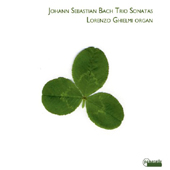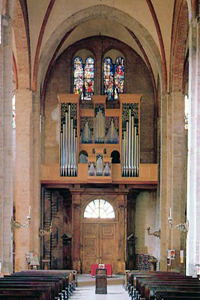
ESSENTIAL RECORDINGS


In an earlier review of Bach's Leipzig Chorales performed by organist Lorenzo Ghielmi, I pointed out his ability to enhance the music's meaning through
his scholarly and technically precise delivery, and these traits still shine through in this new recording of the Trio Sonatas by Johann Sebastian
Bach. In another recent recording of these same pieces on the Alpha label, organist Benjamin Alard seemed to stress the beauty of each note in his playing,
whereas Lorenzo Ghielmi emphasizes each notes meaning in relation to the others, and injects more ornamentation to the musical discourse. Two opposing but equally
valid interpretations, with subtle differences but defining differences nonetheless. These remarkable organ pieces require constant vigilance and musical interplay on the
part of the performer, points not ignored by Ghielmi.
"The six Trio Sonatas are undoubtedly among Bach's absolute masterpieces. Their formal balance and natural melodic lines very well conceal their pedagogical
purpose: Johann Sebastian Bach wanted to give his young son Wilhelm Friedman a series of exercises that would allow him to present himself to the musical world
as an accomplished organ virtuoso. Today, in-depth study and practice of these sonatas is still the best method for acquiring complete independence and equality of the
two hands, refinement in the use of the pedals, tempo stability and the ability to choose appropriate registration." [Lorenzo Ghielmi]
To create such beautifully melodic, inventive and challenging pieces out of technical exercises and teaching material, further illustrates Bach's genius. Not only do they
help develop an organist's multi-tasking skills, they also help in improving a musician's grasp of harmonic and contrapuntal invention. Each and every note within these
sonatas, be it in the right hand, left hand or pedals, plays an integral part within the musical narrative of each movement. And not only are they amazing works from the
organist's point of view, they are also wonderful masterpieces to the ears of listening bystanders.
The instrument used in this recording is the Ahrend Organ of the Basilica of San Simpliciano in Milan. Although it is relatively small at about 30 stops, it does in fact have a 32' stop in
the pedals. It is a bright instrument, but nonetheless includes some beautifully mellow stops that are perfectly matched and balanced to each other, and in the hands of
Lorenzo Ghielmi, its combinations always produce a sound that enhances the music at hand. The 'flute' stops in particular produce a pure, woody sound that could almost
be mistaken for recorders. Another clean and brightly lit recording by Passacaille that helps demonstrate this organ's sunny character and pitch-perfect
speech. Recommended!
Jean-Yves Duperron - March 2011